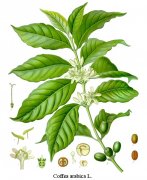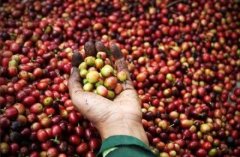Scientists find genetic coffee bean varieties that determine coffee quality
In order to earn more income, coffee growers have been committed to producing higher quality products. But getting high-quality coffee beans means a better understanding of biological processes-flowering, ripening, etc.-that determine the final quality of the product.
Many compounds (sugar, fat, caffeine, etc.) determine the quality of coffee. Their content in coffee beans is the decisive factor. Among them, sucrose plays the most important role in the sensory quality of coffee, because the decomposition of sucrose in the roasting process produces a variety of aromas and other tastes.
Since 2001, CIRAD and Brazil's IAPAR have jointly studied the ripening process of coffee beans. They found a decisive enzyme in sucrose metabolism, which scientists studied using molecular biology and biochemical techniques with the support of the University of Campinas in Brazil. The results showed that this sucrose synthase determined the deposition of sucrose in coffee beans. There are at least two forms of sucrose synthase, which are compiled by two different genes: SUS1 and SUS2.
Scientists analyzed the expression of these genes in a variety of tissues of growing coffee beans. The results showed that SUS2 determined the sucrose deposition during ripening. SUS2 is related to sucrose decomposition and energy production. Another part of the study is genetic diversity, which explains why there are differences between different types of coffee. This helps to confirm the content of sucrose and ultimately affect the quality of coffee.
?? The above research results have been applied at present. Scientists found that coffee grown in shadows had higher activity of sucrose synthase and sucrose phosphate synthase. The final quality of these coffees may also be related to other factors, such as lipids.

Important Notice :
前街咖啡 FrontStreet Coffee has moved to new addredd:
FrontStreet Coffee Address: 315,Donghua East Road,GuangZhou
Tel:020 38364473
- Prev

Coffee cultivation techniques detailed explanation of planting knowledge of Coffee trees
Coffee, cocoa and tea are called the three major beverages in the world, and their output, consumption and output value all rank first. In addition to being used as a beverage, coffee can also extract caffeine and coffee oil; in medicine, it can be used as an anesthetic, stimulant and diuretic cardiotonic agent. Coffee pulp can be used to make wine, vinegar, pectin and molasses; dried pulp can be used as animal feed; dried fruit shell can be used as fertilizer and burning
- Next

Coffee bean production an introduction to coffee production areas around the world
Yunnan coffee in China is a product of the tropics. You may not believe that the best coffee producing area in the world is in Yunnan, China.
Related
- Beginners will see the "Coffee pull flower" guide!
- What is the difference between ice blog purified milk and ordinary milk coffee?
- Why is the Philippines the largest producer of crops in Liberia?
- For coffee extraction, should the fine powder be retained?
- How does extracted espresso fill pressed powder? How much strength does it take to press the powder?
- How to make jasmine cold extract coffee? Is the jasmine + latte good?
- Will this little toy really make the coffee taste better? How does Lily Drip affect coffee extraction?
- Will the action of slapping the filter cup also affect coffee extraction?
- What's the difference between powder-to-water ratio and powder-to-liquid ratio?
- What is the Ethiopian local species? What does it have to do with Heirloom native species?

